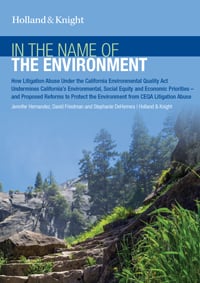In the Name of the Environment: Litigation Abuse Under CEQA
This Holland & Knight report is the first comprehensive study of lawsuits filed under the California Environmental Quality Act (CEQA). Analyzing all CEQA lawsuits filed in California over a three-year period, 2010-2012, the report systematically documents widespread abuse of CEQA litigation that undermines the state’s environmental, social equity and economic priorities.
Among the study's key findings:
- CEQA litigation is not a battle between “business” and “enviros” – 49 percent of all CEQA lawsuits target taxpayer-funded projects with no business or other private sector sponsors.
- Projects designed to advance California’s environmental policy objectives are the most frequent targets of CEQA lawsuits: transit is the most frequently challenged type of infrastructure project, renewable energy is the most frequently challenged type of industrial/utility project, and housing (especially higher density housing) is the most frequently challenged type of private sector project.
- Debunking claims by special interests that CEQA combats sprawl, the study shows that infill projects are the overwhelming target of CEQA lawsuits. For infill/greenfield projects, 80 percent are in infill locations, and only 20 percent are in greenfield locations.
- CEQA litigation is overwhelmingly used in cities, targeting core urban services such as parks, schools, libraries and even senior housing.
- Sixty-four percent of those filing CEQA lawsuits are individuals or local “associations,” the vast majority of which have no prior track record of environmental advocacy – and CEQA litigation abuse is primarily the domain of Not In My Backyard (NIMBY) opponents and special interests such as competitors and labor unions seeking non-environmental outcomes.
The study's authors suggest that ending CEQA litigation abuse is the most cost-effective way to restore the state's middle-class job base; make housing more affordable; ensure that taxpayer funds are spent on projects – not process; and improve the future of the nearly nine million Californians living in poverty. The authors recommend three moderate reforms to curtail the abuse:
- Require those filing CEQA lawsuits to disclose their identity and environmental (or non-environmental) interests.
- Eliminate duplicative lawsuits aimed at derailing plans and projects that have already completed the CEQA process.
- Preserve CEQA’s existing environmental review and public comment requirements, as well as access to litigation remedies for environmental purposes – but restrict judicial invalidation of project approvals to those projects that would harm public health, destroy irreplaceable tribal resources or threaten the ecology.
Read the full complimentary electronic version of this report.
Previous Holland & Knight publications on CEQA include:
- CEQA Judicial Outcomes: Fifteen Years of Reported California Appellate and Supreme Court Decisions, Holland & Knight alert, May 2015
- California's Social Priorities, Chapman University Center for Demographics and Policy, 2015
- California Environmental Quality Act, Greenhouse Gas Regulation and Climate Change, Chapman University Center for Demographics and Policy, 2015
- To Lead on Climate Change, California Must also Lead on Poverty Reduction, Los Angeles Daily News, June 3, 2015
- The National Environmental Policy Act in the Ninth Circuit: Once the Leader, Now the Follower?, Environmental Practice, December 2014
- OPR Proposes to Increase CEQA's Costs, Complexity, and Litigation Risks with SB 743 Implementation, Holland & Knight alert, August 22, 2014
- Analysis of Recent Challenges to Environmental Impact Reports, Holland & Knight alert, December 2012

